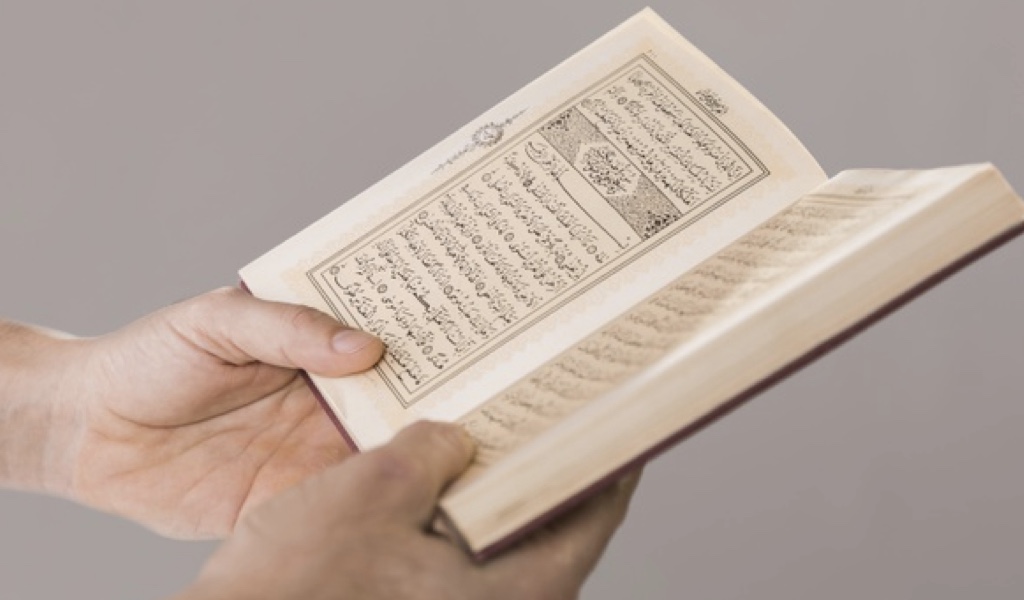How many Ramadan’s have you lived to witness so far? If, till this day, you cannot understand what is being recited during the night prayer, ask yourself a second question:
“How many more Ramadan’s am I going to allow to pass without changing this?”
The fact that your heart isn’t moved by the recitation of the Qur’an isn’t necessarily because your Iman is always lacking, or because of obscuring sins. At times, the reason could be far simpler; You’re yet to familiarise yourself with the language of the Qur’an.
Imam At-Tabari said:
“I am amazed at the one who recites the Qur’an without knowing its meanings how he can take any enjoyment from it”
The Arabic language was chosen for Allah’s last revelation for a reason.
Allah said: إِنَّا جَعَلْنَاهُ قُرْآنًا عَرَبِيًّا لَعَلَّكُمْ تَعْقِلُونَ
“We have made it an *Arabic* Qur’an that you might understand.”
(Al-Qur’an, 43:3)
Allah said: قُرْآنًا عَرَبِيًّا غَيْرَ ذِي عِوَجٍ لَعَلَّهُمْ يَتَّقُونَ
“It is an *Arabic* Qur’ān, without any deviance, so that they might become righteous”
(Al-Qur’an, 39:28)
Allah said:
وَإِنَّهُ لَتَنْزِيلُ رَبِّ الْعَالَمِينَ (192) نَزَلَ بِهِ الرُّوحُ الْأَمِينُ (193) عَلَى قَلْبِكَ لِتَكُونَ مِنَ الْمُنْذِرِينَ (194) بِلِسَانٍ عَرَبِيٍّ مُبِينٍ
“And indeed, it is the revelation of the Lord of the worlds. The Trustworthy Spirit has brought it down. Upon your heart, (O Muḥammad) – that you may be of the warners – In a clear *Arabic* language.”
(Al-Qur’an, 26:192-195)
The famous linguist, Ahmad Ibnu Faaris, said:
“The fact that Allah singles out the Arabic language with the description of ‘Mubeen’/ ‘clear’ shows that all of the languages of the world are inferior to it.”
Arabic is the language of Islam. This has always been the case and will never change, and those amongst us who are yet to make a solid effort in this domain must realise the enormous loss in requiring mortals to stand between them and the words of Allah, where its perfect rhythm, miraculous structure and spellbinding eloquence are lost in translation.
This is what those before us had to say about this topic:
Ubay Ibn Ka'b said:
“Learn the Arabic language like you teach the memorisation of the Qur'aan!”
Abu Bakr said:
“That I recite and forget (a portion of Qur’an) is dearer to me than to make a grammatical mistake (in Arabic)”
'Umar once passed by a group of archers who were training. They had missed their target and so he reprimanded them, to which they responded with weak Arabic, so ‘Umar said:
“Your mistake in grammar is even more painful to me than your mistakes in archery.”
‘Umar also came across a man who was speaking in Persian as he was doing his pilgrimage. ‘Umar took hold of his shoulders and said to him:
“Find a way to speak the Arabic language!”
In fact, whenever Ayoob As-Sikhtiaani would make a mistake in Arabic grammar, he would said: “Allah forgive me!”, considering it a sin.
Both ‘Ali Ibnu Abi Taalib and Ibnu ‘Umar would discipline their children when making mistakes in speaking the Arabic language.
They raised the bar so high, as they realised that the deconstruction of the Arabic language from the hearts of the Muslims will be directly linked to the deconstruction of the Qur’an from their lives.
In the past, wherever Islam made its way, the Arabic language was never far behind. This is why the Muslims never found a need to convey the meanings of Allah’s words in any other language.
With that understanding, therefore, the abundance of translations today is a blessing from one perspective, but saddening from another perspective and a definite sign of our weakness at this point in time.
You have achieved so much already. Your track record is proof that when you put your mind to something, you accomplish it. It’s time to make some key life-changing decisions;
“Next Ramadan, I will understand the words of Allah”
Say “Insha’Allah”
Now formulate a strategy for it.
Subscribe for Updates
Original content used with permission from:






